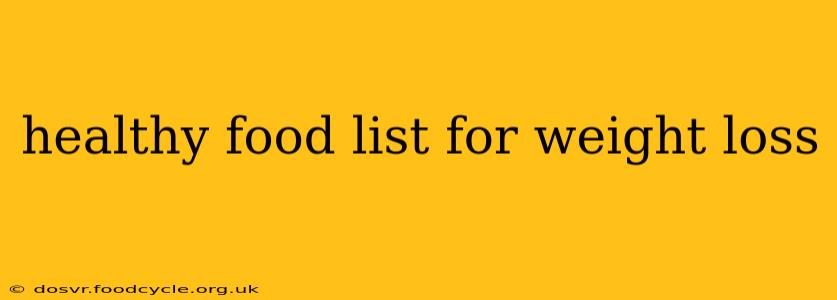Losing weight effectively and sustainably isn't about deprivation; it's about making informed choices that nourish your body and support your weight loss goals. This comprehensive guide provides a healthy food list for weight loss, focusing on nutrient-dense options that keep you feeling full and energized while shedding those extra pounds. We'll explore various food groups and address common questions surrounding healthy eating for weight management.
What are the Best Foods for Weight Loss?
The best foods for weight loss are those that are low in calories but high in nutrients, promoting satiety and aiding in fat burning. Prioritizing whole, unprocessed foods is crucial. Here's a breakdown of key food categories:
1. Lean Proteins: Protein is essential for building and repairing tissues, boosting metabolism, and promoting feelings of fullness. Excellent choices include:
- Chicken Breast: A low-fat, high-protein powerhouse.
- Fish (Salmon, Tuna, Cod): Rich in omega-3 fatty acids, beneficial for overall health.
- Lean Beef: Opt for cuts with low fat content.
- Turkey Breast: Similar to chicken, offering lean protein.
- Eggs: Versatile and packed with protein and essential nutrients.
- Beans and Lentils: Excellent sources of plant-based protein and fiber.
- Greek Yogurt: High in protein and calcium.
2. Fruits and Vegetables: These are low in calories and high in fiber, vitamins, and minerals, keeping you full and energized. Aim for a variety of colors for a wider range of nutrients:
- Berries (Strawberries, Blueberries, Raspberries): Low in calories and high in antioxidants.
- Leafy Greens (Spinach, Kale, Lettuce): Packed with vitamins and minerals.
- Cruciferous Vegetables (Broccoli, Cauliflower, Brussels Sprouts): Rich in fiber and nutrients.
- Avocado: Healthy fats that contribute to satiety.
- Apples: High in fiber and beneficial for digestion.
- Citrus Fruits (Oranges, Grapefruits, Lemons): Rich in Vitamin C and antioxidants.
3. Whole Grains: Unlike refined grains, whole grains are rich in fiber, which aids digestion and promotes fullness. Choose options like:
- Brown Rice: A healthier alternative to white rice.
- Quinoa: A complete protein source and rich in fiber.
- Oats: High in fiber and soluble fiber, beneficial for cholesterol levels.
- Whole-Wheat Bread: Opt for options with minimal added sugar.
4. Healthy Fats: Don't eliminate fats entirely; incorporate healthy fats in moderation. These fats contribute to satiety and support various bodily functions:
- Avocados: A good source of monounsaturated fats.
- Nuts and Seeds (Almonds, Walnuts, Chia Seeds, Flax Seeds): Rich in healthy fats, fiber, and protein.
- Olive Oil: Use it for cooking and dressing salads.
What Drinks Help with Weight Loss?
Staying hydrated is crucial for weight loss. Choose these beverages:
- Water: The best choice for hydration.
- Unsweetened Tea: Provides antioxidants and hydration.
- Black Coffee (Unsweetened): Can boost metabolism.
Avoid sugary drinks like soda, juice, and sweetened beverages, as they are high in calories and contribute to weight gain.
What Foods Should I Avoid for Weight Loss?
To maximize your weight loss efforts, minimize or eliminate these foods:
- Processed Foods: Often high in calories, unhealthy fats, and added sugars.
- Sugary Drinks: Empty calories that contribute to weight gain.
- Fast Food: Typically high in calories, unhealthy fats, and sodium.
- Excessive Alcohol: High in calories and can hinder weight loss efforts.
- Refined Grains: Lack fiber and can lead to blood sugar spikes.
How Much Protein Should I Eat for Weight Loss?
The recommended protein intake for weight loss varies depending on individual factors like activity level, gender, and body composition. Generally, aiming for 1.2 to 1.6 grams of protein per kilogram of body weight is a good starting point. Consult a nutritionist or dietitian for personalized recommendations.
What is the Best Diet for Weight Loss?
There's no one-size-fits-all "best" diet. The most effective approach is a balanced, sustainable diet that incorporates the foods listed above while minimizing processed foods, sugary drinks, and excessive unhealthy fats. Focus on creating a healthy eating pattern that you can maintain long-term.
Conclusion: A Sustainable Approach to Weight Loss
This healthy food list for weight loss serves as a guide to making nutritious choices that support your weight loss journey. Remember that sustainable weight loss is a marathon, not a sprint. Combine a healthy diet with regular exercise, adequate sleep, and stress management for optimal results. Consulting a registered dietitian or healthcare professional can provide personalized guidance and support tailored to your specific needs and health conditions.
